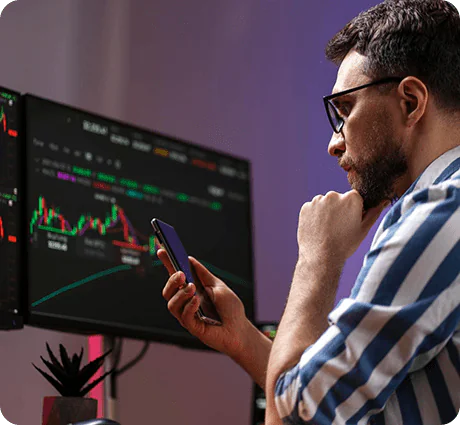Sécurelis V7.0


Looking to understand investing but don’t know where to start? Sécurelis V7.0 encourages individuals to approach investing with an education-first mindset. That way, individuals can learn to make informed investment decisions amid uncertainties. Investing is simple yet complex.
It takes an educated investor to navigate the intricate investment landscape. The investment landscape covers a vast and diverse array of opportunities, each with its risks and possible rewards. Understanding this complex terrain is crucial for individuals who wish to be called informed investors.
One of the critical aspects of the investment landscape is the range of asset classes available to investors. These include stocks, crypto coins, real estate, commodities, etc. Each asset class behaves differently and carries its risk. By learning about these asset classes, investors can make strategic decisions about allocating their capital and building a diversified portfolio.

At Sécurelis V7.0, education is paramount. We believe that informed decisions stem from a solid understanding of financial principles. Sécurelis V7.0 connects people to suitable investment education firms that provide comprehensive educational resources to aid individuals in navigating the complexities of the investment landscape.
Ready to take the first step towards financial literacy? Sécurelis V7.0 matches individuals with investment education firms tailored to their learning needs.
Start the journey towards financial literacy by accessing suitable educational resources and training. Sign up on Sécurelis V7.0 for free.
The investment world can be daunting, especially if one is new to finance. At Sécurelis V7.0, we understand beginners' challenges and are here to point them toward learning and enlightenment.
We connect beginners to educational firms that offer educational resources that cater to novice investors, providing them with the knowledge and tools they need to build a solid investment knowledge foundation.

Signing up on Sécurelis V7.0 is easy. Individuals provide their name, email, and phone number to match with a suitable education firm.
Our solution analyzes users' data and preferences to connect them with education firms tailored to their needs and learning styles.
Once matched, individuals are assigned a dedicated representative from the educational firm who will address their inquiries and provide unique login details, allowing them to commence their learning journey.

Technology has revolutionized the investing landscape, ushering in unprecedented access and innovation. From algorithmic trading and robo-advisors to online trading platforms and mobile apps, technological advancements have democratized investing, allowing individuals to participate in markets like never before.
Blockchain technology has redefined how assets are traded, offering increased transparency and security in investment transactions. Furthermore, technology has expanded the range of investment vehicles available to individuals, with crowdfunding platforms, peer-to-peer lending, and digital assets opening up new avenues for diversification. All these have also introduced some more complexity to the investment scene. Thankfully, anyone can learn about it all in basic terms from suitable investment education firms accessible via Sécurelis V7.0.
At Sécurelis V7.0, inclusivity is more than a buzzword; it's a core value. We are committed to connecting individuals from all backgrounds and levels of expertise to fitting investment education firms ready to teach them what they need to be informed investors. Sécurelis V7.0 ensures everyone has a chance at investment literacy.
Investing is allocating resources, usually money, to try for income or gains over time. It involves purchasing stocks, cryptocurrencies, real estate, or commodities. Understanding the basics of investing is essential for individuals seeking to pursue their financial goals, such as retirement planning or funding education. Investors can make informed decisions by learning key concepts, strategies, and risks.
One of the fundamental investing principles is the trade-off between risk and return. Higher-risk investments may offer higher returns but also come with increased uncertainty and possible significant losses. Conversely, lower-risk investments may offer more stability but yield lower overall returns. By assessing their risk tolerance and investment objectives, individuals can determine an appropriate balance between risk and return that aligns with their financial goals.
Diversification is another crucial concept in investing. It involves spreading investments across different asset classes, industries, and geographic regions to try and reduce portfolio risk. Diversification helps mitigate the impact of any single investment's poor performance on the entire portfolio and may enhance long-term returns. Additionally, understanding how to analyze financial metrics, evaluate investment opportunities, and manage investment risks is essential for informed investing.

Financial metrics are quantitative measures to assess a company's financial activities' performance, health, and efficiency. These metrics provide insights into various aspects of a company's operations, such as liquidity, solvency, and efficiency. Financial metrics include earnings per share (EPS), return on investment (R.O.I.), debt-to-equity ratio, and operating cash flow.
Financial metrics are key indicators of a company's financial health and performance, helping stakeholders gauge its ability to make returns, manage debt, and sustain growth. Understanding and interpreting financial metrics are essential for investors and professionals seeking to assess investment opportunities, evaluate risks, and optimize portfolio management strategies.
EPS measures a stock’s viability by dividing the company’s net income by the number of outstanding shares. It indicates the portion of a company's gains allocated to each share of common stock, providing insights into its shareholder value.
ROI evaluates the efficiency of an investment by comparing the gain or loss generated relative to its cost. It is calculated by dividing an investment's net gain (or loss) by its initial cost and expressed as a percentage. ROI helps investors assess the performance of their assets.
The debt-to-equity ratio measures a company's finances by comparing its total debt to its shareholders' equity. It indicates the proportion of debt used to finance a company's assets relative to the equity shareholders contribute. A higher ratio suggests higher financial risk, while a lower ratio implies a more conservative capital structure.
OCF reflects the cash generated from a company's core business operations. It represents the cash inflows and outflows resulting from day-to-day business activities, excluding financing and investing activities. OCF is a crucial indicator of a company's ability to generate cash and meet operating expenses.

Assets refer to individuals' various portfolio investments, including stocks, bonds, real estate, cash, and alternative investments. Asset allocation is the strategic distribution of these assets across different categories based on risk tolerance, investment goals, and time horizon. By diversifying across asset classes, investors may reduce overall portfolio risk.
Asset allocation is a key component of portfolio management, allowing investors to try and optimize their risk-return profile and pursue their financial objectives. Asset allocation often involves periodically rebalancing the portfolio to maintain the desired allocation percentages and adjusting the mix as financial goals or market conditions change.
Understanding the intricate web of the financial landscape is essential for investors. This vast terrain encompasses various asset classes, including stocks, bonds, real estate, and commodities, each with a risk-return profile and market dynamics. Navigating this landscape requires a deep understanding of economic principles, market trends, and investment strategies.
The financial landscape is influenced by economic indicators, geopolitical events, and technological advancements, which can impact investment well-being and risks. Investors must stay informed and adapt to changing market conditions.
Navigating the financial landscape also involves crafting a balanced investment portfolio that aligns with one's financial goals, risk tolerance, and time horizon. Diversification across asset classes and regions may help spread risk and optimize returns. Learn more about navigating the financial landscape as an educated investor via Sécurelis V7.0.


Investment strategies are the blueprints investors use to pursue their financial goals. From passive strategies like buy-and-hold to active approaches like value investing or growth investing, understanding these strategies is crucial for navigating the complexities of the market and building a portfolio aligned with an individual's objectives and risk tolerance. Sécurelis V7.0 encourages continuous learning in investments.
Passive investing involves buying and holding a diversified portfolio of assets to track a market index. It requires minimal trading and aims to pursue long-term returns with low fees.
Active investing involves actively buying and selling assets to try and outperform the market. It requires research, analysis, and frequent trading than a benchmark index.
Value investing involves identifying supposedly undervalued assets trading below their intrinsic value. Investors seek companies with strong fundamentals, aiming to buy low and sell high.
Growth investing focuses on investing in companies that may have a strong chance for expansion, often characterized by high revenue and earnings growth rates. Investors prioritize future growth prospects over current valuation, seeking capital appreciation over time.
Income investing aims for a steady income stream through investments such as dividend-paying stocks, bonds, and real estate investment trusts (REITs). Investors prioritize regular income distributions over capital appreciation.
Technical analysis involves analyzing past market data, such as price and volume patterns, to forecast future price movements. Investors use charts and technical indicators to identify trends and make trading decisions.
Begin the journey to investment literacy with Sécurelis V7.0. We offer direct matches to investment education firms that offer individuals accessible and comprehensive educational resources tailored to every level of knowledge. It doesn't matter if one is a novice investor or a seasoned pro; Sécurelis V7.0 connects them to education firms that provide the training they need to navigate the complexities of the investment landscape.

| 🤖 Initial Cost | Registration is without cost |
| 💰 Fee Policy | Zero fees applied |
| 📋 How to Register | Quick, no-hassle signup |
| 📊 Educational Scope | Offerings include Cryptocurrency, Forex, and Funds management |
| 🌎 Countries Serviced | Operates globally except in the USA |


